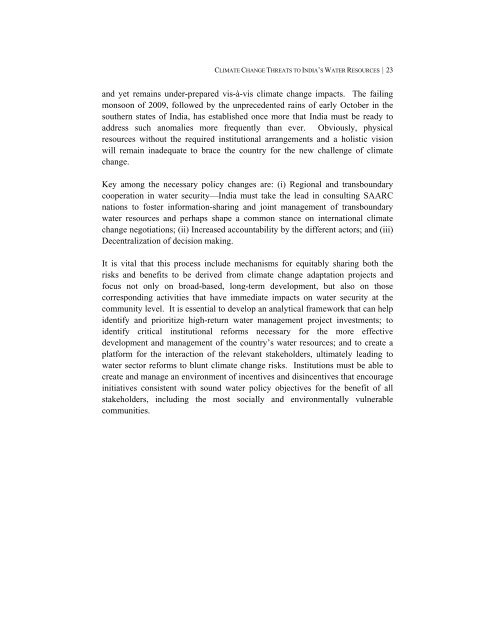Indian Climate Policy - Global Commons Institute
Indian Climate Policy - Global Commons Institute
Indian Climate Policy - Global Commons Institute
Create successful ePaper yourself
Turn your PDF publications into a flip-book with our unique Google optimized e-Paper software.
CLIMATE CHANGE THREATS TO INDIA’S WATER RESOURCES | 23<br />
and yet remains under-prepared vis-à-vis climate change impacts. The failing<br />
monsoon of 2009, followed by the unprecedented rains of early October in the<br />
southern states of India, has established once more that India must be ready to<br />
address such anomalies more frequently than ever. Obviously, physical<br />
resources without the required institutional arrangements and a holistic vision<br />
will remain inadequate to brace the country for the new challenge of climate<br />
change.<br />
Key among the necessary policy changes are: (i) Regional and transboundary<br />
cooperation in water security—India must take the lead in consulting SAARC<br />
nations to foster information-sharing and joint management of transboundary<br />
water resources and perhaps shape a common stance on international climate<br />
change negotiations; (ii) Increased accountability by the different actors; and (iii)<br />
Decentralization of decision making.<br />
It is vital that this process include mechanisms for equitably sharing both the<br />
risks and benefits to be derived from climate change adaptation projects and<br />
focus not only on broad-based, long-term development, but also on those<br />
corresponding activities that have immediate impacts on water security at the<br />
community level. It is essential to develop an analytical framework that can help<br />
identify and prioritize high-return water management project investments; to<br />
identify critical institutional reforms necessary for the more effective<br />
development and management of the country’s water resources; and to create a<br />
platform for the interaction of the relevant stakeholders, ultimately leading to<br />
water sector reforms to blunt climate change risks. Institutions must be able to<br />
create and manage an environment of incentives and disincentives that encourage<br />
initiatives consistent with sound water policy objectives for the benefit of all<br />
stakeholders, including the most socially and environmentally vulnerable<br />
communities.
















